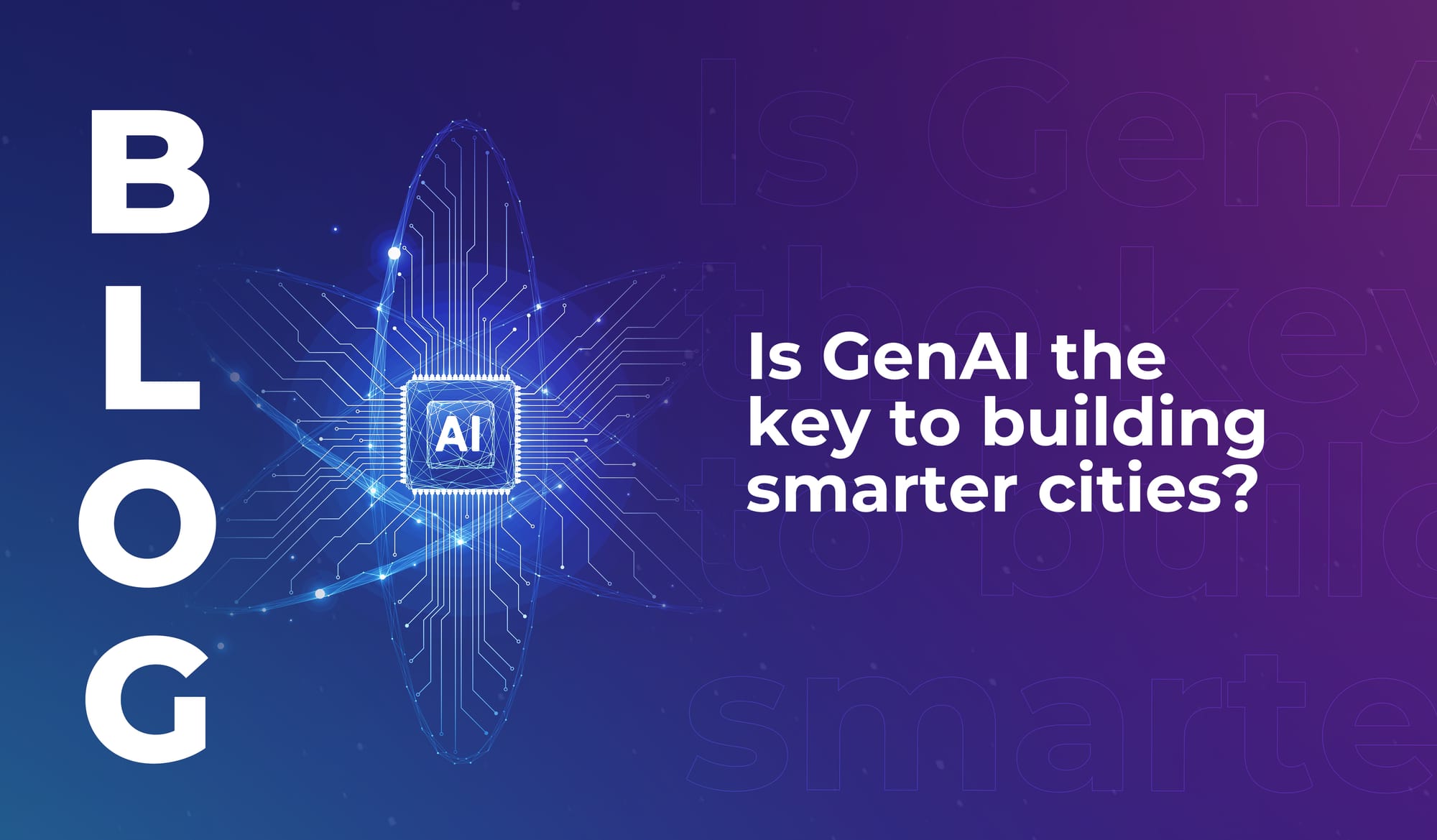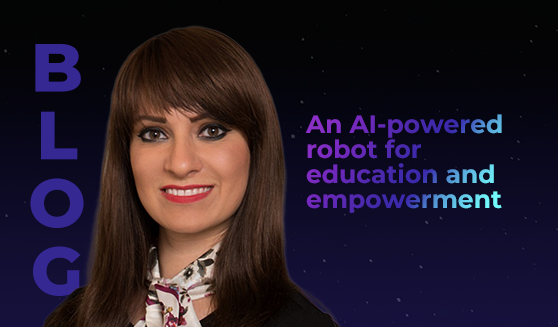
Is GenAI the key to building smarter cities?
Learn how generative AI is unlocking the true potential of digital twins – to make smart cities more efficient, inclusive, and citizen-focused.


We interviewed #LEAP23 speaker Elnaz Sarraf (Founder and CEO at ROYBI Robot) to learn how she came up with her life-changing product (clue: it started with sketches on paper in her bedroom), and how she navigated the journey from the seed of an idea, to raising funding of $4.2 million in a 2019 seed round.
ROYBI Robot is the world’s first AI-powered smart toy, designed to teach language and STEM skills to children. It’ll provide personalised learning to children who might not have access to high quality education resources locally – using AI to enable engaging, self-guided learning experiences.
“Our idea started on a much broader scale. We did a lot of market research, talked to many people and experts, and realised there is a huge gap in the early years of learning, yet it is the most critical time in a child’s development. There are more than 250 million children in the world that may not reach their full potential by age five because their potential is not really discovered.
“The idea of ROYBI started 4.5 years ago literally from my bedroom, with sketches on paper, and a big mission to close the gap in early childhood education.The company started with only 2 people, we bootstrapped the company for about 1.5 years. Me and my team went on this journey to utilise AI and Machine Learning to create a personalised experience for little children, being able to use data to learn more about them and their interests rather than one-size-fits-all.
“When we started talking about our product and mission, we saw incredible need and traction for this technology. It was a very difficult journey. We ran out of cash a couple of times, got so many rejections, but ultimately raised $4.2M in our seed round in 2019 and now we have offices in California, and China and growing. After over 200 rejections and many naysayers, we were able to raise the fund from Angel Investors in Silicon Valley.”
“First, companies need to come together and create awareness towards the positive sides of AI and robots. We need to continue educating people that AI and robots can accelerate the quality of life in many areas such as health, autonomous driving, finance, education, and more. This of course will take several years until people start seeing the benefits of using AI and robotics specifically in education. We need to educate people how robots work and that the system needs data and training to make smarter decisions.
“Second, the media and government can regulate the use of advanced technologies but also allow for innovation and creativity. They need to stop spreading misinformation or fear among people that companies using AI and robotics have only one purpose and that is to control people’s lives. Yes, there will always be companies that will misuse data as we hear many stories but there are also many companies and startups that use AI and robots to empower humans as well as youth.
“In our case, we use AI and robots to deliver content based on every child’s needs. Also, for tech-savvy parents and their children, technologically advanced tools like robots can help families create an active learning environment. Schools can utilise robots and AI to teach children through more accurate data and reach them even in remote locations. Robots can scale at large with less costs involved.”
“I think the biggest challenge has been fundraising. I am not sure if it actually has much to do with me being a female CEO, but I’ve seen many companies with way less traction than my company secure funding faster. I also feel women are asked different types of questions than men during investor meetings. I remember at some point the investors were asking me strange questions like how much debt the company has, or how do I ensure the company doesn’t fail. They never asked me about the vision, tractions, etc. So, I really got frustrated about this and decided to always bring a male colleague to my meetings.
“As I expected, the type of questions started changing. They asked about long-term vision, sales, product roadmap, etc. I am not saying this is necessarily related to being a female CEO, but I strongly believe women are treated differently during investment meetings.
“For me these challenges actually make me stronger. I know I am a strong woman and can achieve anything I set my mind to. I also want to make my dreams come true so I can pave the way for other women who get into tech. I want to be one of the people that shows the world that women are incredibly talented and smart to build unicorn companies. Therefore, I keep moving forward knowing that I will eventually make an impact.”
“When I was raising funds for our seed round, I heard so many rejections that often, I asked myself if what I am doing is right. There were plenty of people who told me I should just stop trying or try other future ideas. Some said that it is not worth losing all my money over this idea and just find a 9-5 job and then work on something else in the future. All these comments were quite discouraging. However, I firmly believed in ROYBI and the idea of using artificial intelligence to change the way children learn.
“Fast forward, I was able to eventually raise $4.2M financing in our seed round in 2019 without even a fully functioning prototype. And finally, the bright days came. ROYBI Robot was featured two times on TIME Magazine’s cover as one of the best inventions in education, CNBC named ROYBI as one of the most promising startups to watch, and Forbes called us the game-changers for children.
“I am a person who gets excited even for small things in the business. Every little step towards our goals and mission makes me feel I want to fly. Every time I see a child laugh when playing with ROYBI, I get so excited that I cannot even put in words. Seeing the impact we are making on children’s lives is the moment I get overly excited and want to work even harder to make a difference.”
“When I started my business, I didn’t know a lot about social media advertising. I had a great experience with retail and distribution sales but not much with e-commerce sales and advertisement. So it took me several tries with agencies where I didn’t know the right questions to ask. I ended up hiring a couple of agencies that could not help us grow and wasted a few months of our time. Eventually, I decided to take this opportunity and learn as much as I can. Since then, I was able to increase our sales month over month and now I am a lot more confident when it comes to online marketing.”
Thanks to Elnaz Sarraf at ROYBI Robot. Discover LEAP to learn more.

Learn how generative AI is unlocking the true potential of digital twins – to make smart cities more efficient, inclusive, and citizen-focused.

The smart cities of the future will use tech to lower emissions, cut urban temperatures, and improve quality of life in highly populated areas.

Discover the cities that rank highly for smart city preparedness, and learn why locally relevant innovation is more important than cutting-edge tech.

Learn how generative AI is unlocking the true potential of digital twins – to make smart cities more efficient, inclusive, and citizen-focused.

The smart cities of the future will use tech to lower emissions, cut urban temperatures, and improve quality of life in highly populated areas.

Discover the cities that rank highly for smart city preparedness, and learn why locally relevant innovation is more important than cutting-edge tech.